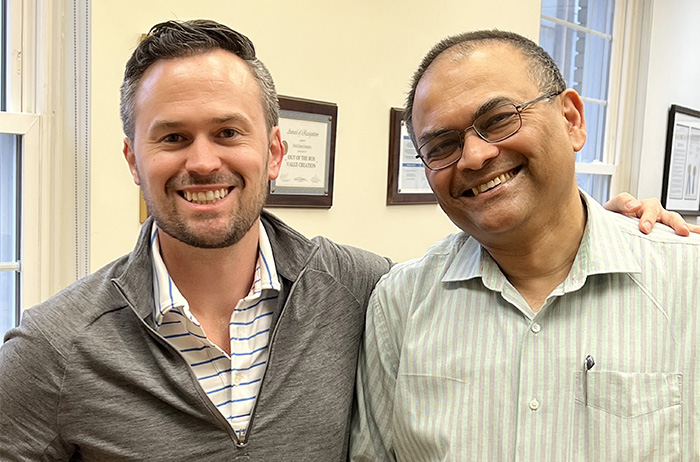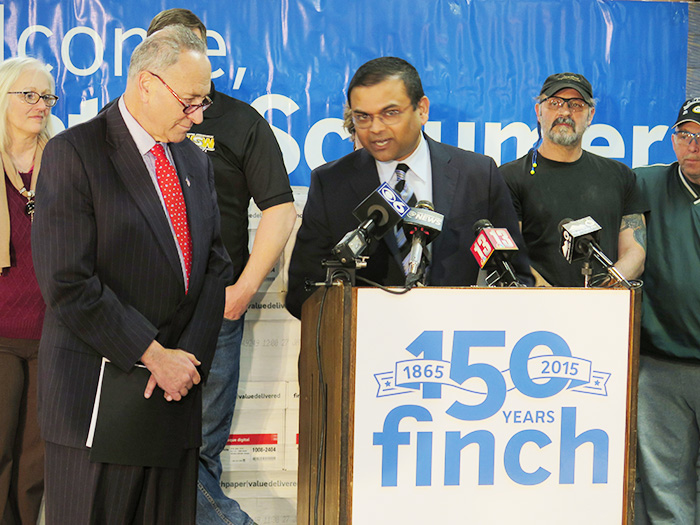By Mark Frost & Zander Frost, Chronicle Editor & Staff Writer
Finch Paper, the Glens Falls cornerstone that dates from 1865 and employs 600 people, will have a new CEO as of Feb. 1. After 12 years, Debabrata “Deba” Mukherjee hands the reins to Drew Gardner and will become board chairman.
The Chronicle conducted an exclusive interview with the two men on Monday.

Mr. Gardner, originally from the Philadelphia area, is a Pennsylvania State University grad, in engineering and finance. He arrived at Finch Paper in 2023 and most recently has been President and CFO. He previously worked for Atlas Holdings, Finch’s parent company, and before that for Blackstone and General Electric. “Deba has been mentoring me for a long time,” said Mr. Gardner, who declined to reveal his age. “I knew when I was going to take this on that it was going to be really, really challenging.
“But I also knew the position that Finch has in the market, and the team that we have here. We are set up to be far more successful than any of our competitors if we do our jobs correctly.”
The men cite significant challenges and opportunities for the papermaker.
One challenge: Demand for paper has fallen by about half in the past decade.
Mr. Gardner said, “North American demand in our space — we call it uncoated free sheet is the broad commodity — was, when Deba stepped in, around 10 million tons annually. And now it’s just about 5 million.”
Mr. Mukherjee said Finch produces, “give or take, 300,000 tons. So that five million tons, you can do the math. It’s roughly 17-18-19 mills” that ceased to exist. “Half of the entire capacity of North America has gone away,” he said.
“We have been sustainably doing well, in spite of all the challenges….We have a very, very dedicated group of people here who cares deeply about Finch and what it means to them and their families.”
Mr. Gardner said, “I remember when Deba was educating me on Finch and talking to me about the idea of coming on board. He talked about the culture of this place, and just explaining how the people here bleed Finch.
“You know, anytime you’re talking about taking a new job, you’ve got to be a little skeptical about how they talk about culture, right? Because it sounds nice, but I’ll believe it when I see it.
“I got here, and it really is the case. The people here bleed Finch. I mean, the care that goes into the products. We make the focus on the customer. All of it is real.”
He noted, “We have fifth generation paper makers here. It’s just the roots that we have in this town are unbelievable.”
The Finch execs say the shutdown of other papermills means new customers are available — and it’s an incentive to expand its own offering of products.
“Atlas acquired Finch in 2007,” Mr. Gardner explained. “At that time, this mill was heavily product-concentrated to what we would call opaque papers — really high-end premium — think paper that goes into brochures and high-end printing paper, and that’s fantastic. It’s a really nice grade of paper. And it would be incredible if we could have stayed there forever.”
It didn’t. “From 2007 to 2013, those markets after the global financial crisis really got hit very, very hard. And so after Deba stepped in, the story of Finch has really been one of continuous product diversification,” Mr. Gardner said.
“Instead of just the high end stuff, [we are] doing things like more copy paper and doing paper grades that serve book printing and doing paper grades that go into envelopes and folders and digital printing and things of that nature.”
Of the overall demand for paper, Mr. Gardner says, “We don’t think that trend is going to reverse. However, we do think that uncoated papers have a long-term role in our society’s future, beyond just printing and writing papers, right?

“So for the future, my job is to continue this journey, which is continuous diversification of what our mill can do here, and to really pick up a lot of the volume that these other mills are unable to do.
“And that’s what’s going to allow us to be successful for the long term, in addition to being able to continuously invest in our assets here so that we can be competitive.”
He said Finch is uniquely adaptable, as to both its machines and its people.
“You need the people that can actually figure out, okay, how do I take this same machine that used to be running, like three to five products, and be able to make that machine run 50-100 products.
“And that capability, both from a team perspective and an asset perspective, coupled with a very low leverage stable balance sheet, makes us one of the most stable uncoated free sheet suppliers in the North American market today.”
Mr. Mukherjee adds, “It’s also a diversification of customers within the product line. We constantly acquire new customers. And so we not only diversify our product lines, we also diversify our customer base within the product line.
“But it only is possible because we were prepared….It’s been a deliberate small shift every month and every year. That’s the way to think about it, because when you are in trouble, none of those big shifts can happen. It’s too late. It takes too long.
“And so our strategy has been to continue that journey every year, every day, every month, and sooner or later, we are at a different place than when we started.
“But we didn’t do it all in one year, one month or one crisis. We did it over a long period of time, and that has been what has made us be here.
“I think we’re in a good spot. I think the paper industry will evolve and change, and that puts us into good opportunity sets to even grow. As long as you are prepared, opportunities will come as a result of that.”
Being financially sound is another advantage Mr. Mukherjee cites.
“We have been able to operate with low leverage, which is unusual for our type of businesses, which in non technical terms, means low debt.
“We have been able to tide over difficult times with no issues. It would have been much more tempting to have not done that, but we have done that, because we think it’s the right long-term way to run this business, and what it means to the community overall.”
Another long-term aspect that Mr. Mukherjee cites with pride, “Almost all of my management team members have been with me the entire 10 years. So there has been almost no change.”
But serious challenges are ongoing. Maintaining the work force is one.
“Attracting talent has improved,” said Mr. Mukherjee, “but we have fallen behind because the number and the amount of retirements have overwhelmed the pool of talent we can get. The older generation aging out is much more, so — net, net — we are falling behind.
“We need more people. We have open positions. We need people to come and stay. We need people that want to be in this field. We need all of the above.
“We need young talent that has a desire to work long-term in manufacturing and move up the ranks. We need outside the state talent, but we need in-state talent, and we want that because we are falling behind.”
Mr. Gardner said, “If there’s one thing we’d like your readers to know, it’s that we’re open for business. We’re always hiring. We have fantastic roles here that have really great long term paths.
Mr. Mukherjee added, “They should come and work here and develop a career. We pay well, and I think with overtime and everything, it’s a very good profession. So I think we need to encourage our trade school folks to come and join us. We need people.”
Mr. Mukherjee in an interview with The Chronicle years ago cited a similar problem among the independent loggers who provide the mill with pulp wood.
“That challenge has not gone away,” he says. “In fact, it has gotten worse because of the same exact issue. Their dads were working. They hung it up. Their kids don’t always want to go into the same profession.”
To encourage more people to pursue logging, “we have been talking to Paul Smith’s College” and Mr. Mukherjee also mentions seeking help from “EDC, maybe some equipment financing, because logging is a heavy equipment type of profession, we need to reinvigorate.”
Imports remain a huge challenge for Finch as with other manufacturers.
“Our foreign competitors,” Mr. Mukherjee said, “do not adhere to the same set of regulations that we do, whether it’s OSHA, whether it’s EPA, whether it’s the Leave [Family and Medical Leave] Act — all of that has a cost to us, but none of the cost to them. And then we talk about trade as free, it isn’t free….It’s not the same in Brazil like it is here.”
He said, “It’s just a sad reality — they’re underpriced because of the competitive advantage they have in their host country, the labor laws are not the same, environmental laws are not the same.”
Mr. Mukherjee calls for “equilibration” to achieve a balance.
What is his view on imposing tariffs?
“I’m a huge supporter of tariffs,” Mr. Mukerjhee replied. “We can compete with anybody, but we have to level the playing field.”
He said in 2014 Finch and other companies joined together in a federal lawsuit charging unfair trade practices
.
They won. The impact? “It slowed down the shutting down of U.S. facilities in significant ways,” Mr. Mukherjee said.
Mr. Gardner said, “Imports as a percent of rough total demand dropped from north of 10% all the way down to 7%, and that’s where we believe it belongs.”
Mr. Gardner, “We are now drifting back up into the 13 to 15% of total U.S. demand, or North American demand, being supplied by imports.”
Mr. Mukherjee says the industry trade group is eyeing filing another challenge.
“I think people are starting to understand that if we don’t protect U.S. manufacturing, we won’t have a manufacturing base and without a manufacturing base we don’t have, as COVID taught us, we don’t have things that we need. And I think that’s very important,” Mr. Mukherjee said.
Another challenge comes from state and federal regulators.
While Mr. Gardner said New York is “overall very supportive of Finch…of manufacturers,” he says “well-intentioned regulatory frameworks end up…implemented in a way that’s just really hard to operate.”
He says, “I think the single best example of this is New York State’s 196-B paid sick leave benefits, which says that every employer needs to provide 56 hours of sick time that their employees can take off for any reason whatsoever.
“It started with you had to be sick in order to take that time off. But over time, they’ve used that as a mechanism to expand it to be able to take it off for any reason whatsoever. And so when you couple that in a manufacturing environment where we need to be running 24/7, but now these employees have the ability to call off last minute, no notice, we don’t have an ability to fill that vacancy, and that becomes very problematic.
“And we know that that definitely contributed to a lot of the closures we’ve seen locally in the area. So it’s not just us that’s battling this. It’s a lot of others as well. And there’s other examples of that.
“There’s another regulation that looks like it may be coming up in New York State, which would require the manufacturers of various products, paper potentially being one of them, to cover the cost of recycling those products at end of life.
“Now the problem with that is that would inflict a heavy toll on U.S. based manufacturers like ourselves, while putting no toll on a lot of the imports that are coming in from Asia, Portugal, Brazil, and all these other places, so it penalizes us, drives our costs up, and means our prices have to go higher.
“And then New York State turns around and procures its paper from abroad. So it’s a challenging state to operate in.”
Natural gas is another live issue.
“We need natural gas to run this mill,” says Mr. Mukherjee. “It has been a long- term issue that we have lobbied for. Trust me, this mill cannot run on solar, it can’t be done.
“We have a lot of biomass, we have hydro. We are as clean as clean gets, but we need the support and the recognition that if we want to have a vibrant upstate economy, we need the infrastructure that comes with sources of natural gas.
“We are not in a warm climate. In the winter — we need it. And so sometimes when we get restrictions on natural gas, which we do in the winter, that’s an issue.”
Explaining the restrictions, Mr. Gardner said, “the use of natural gas is limited in the winter time when everybody’s burning natural gas for heat reasons. So they curtail the large users of natural gas. Right now we’ve been in one for like 10 or 15 days. That’s very challenging.”
The State’s rationale? Mr. Gardner says, “Instead of investing in a pipeline that would run from the Marcellus shale in Pennsylvania up here, where you could have much better natural gas supply, they’re saying, ‘Well, that would just mean that New York State would be more dependent on natural gas than ever. And really what we need to do is be moving off of fossil fuels, and so we don’t want to create a new pipeline that’s going to disincentivize people from moving away from those fossil fuel sources.’”
Mr. Mukherjee urges, “We need an all of the above strategy, until the alternative is all set. So I think that’s an important piece of this.”
Mr. Gardner adds a diplomatic note. “I don’t want this to be taken as a complaining session about New York State. Generally, they’re very supportive. There’s just work we have to do.
Yet another challenge: Some people wish Finch would just go away, welcome the idea of the mill shutting down.
“I’ve heard that,” Mr. Mukherjee acknowledged. “Half a billion dollars is what we create in the local economy….All you’ve got to do is to visit mill towns that don’t have a mill to know the impact of the devastation that the mill not being there has to the local population.”
Mr. Mukherjee noted that he has spent his career in small towns where papermills have been the essential industry.
“The people have a brighter future because they can be educated well. People have jobs, and therefore they can support local economies. We have a development project downtown, and people can buy it because they are well-paid.”
“The local population is massively benefited by our existence,” Mr. Gardner added. “The economic impact to Deba’s point is north of $400 million annually.”
Mr. Mukherjee and Mr. Gardner relish the chance to make their case.
“As one of the few survivors of the paper business, it’s both our obligation and our opportunity,” Mr. Mukherjee said.
“The opportunity we have is to be here for a very, very long time. The obligation we have is to educate everybody as to the challenges that exist.”
“We are very optimistic, and this transition has been wildly successful so far,” Mukherjee said. “I think we are in good shape with the talent we have, the experience we have, combined with the energy and intensity and enthusiasm.”
“If we execute well, then the future looks really bright,” said Mr. Gardner.
Finch also operates French Paper in MI; Deba was CEO also of Twin Rivers Paper
Deba Mukherjee is stepping down as CEO of two separate paper companies, both owned by Atlas Holdings.
His successor is Drew Gardner at Glens Falls-based Finch Paper, which also operates French Paper in Michigan, purchased in 2019.
Tyler Rajeski is his successor as CEO at Twins Rivers Paper, a separate company that operates three paper mills in central New York — Mill Street and Mohawk Valley in Little Falls and Lyonsdale in Lyons Falls, plus one in Madawaska, Maine and a pulp mill in Edmundston, Canada.
Mr. Mukherjee becomes chairman of both Finch and Twin Rivers Paper.
Copyright © 2025 Lone Oak Publishing Co., Inc. All Rights Reserved
 Glens Falls Chronicle Serving the Glens Falls/Lake George region; Warren, Washington and northern Saratoga counties since 1980
Glens Falls Chronicle Serving the Glens Falls/Lake George region; Warren, Washington and northern Saratoga counties since 1980


